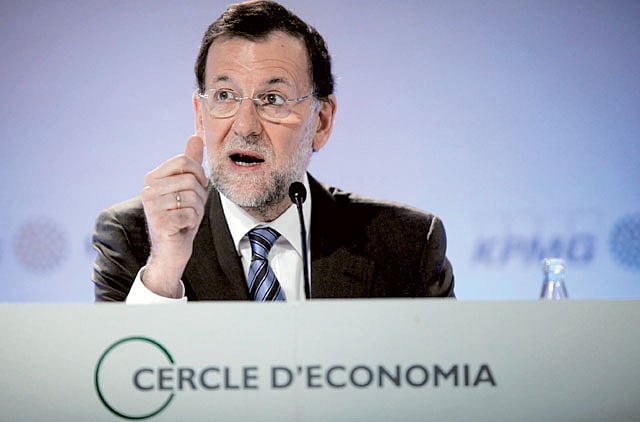Spain suggests new fiscal authority
Spanish premier proposes creation of new fiscal authority to manage EU debts

Madrid: Spain’s Prime Minister on Saturday proposed the creation of a new fiscal authority in the Eurozone which would control and harmonise national budgets and manage the European debts.
“The European Union needs to reinforce its architecture,” Rajoy said at an event in Sitges, in the north-eastern province of Catalonia. “This entails moving towards more integration, transferring more sovereignty, especially in the fiscal field.
“And this means a compromise to create a new European fiscal authority which would guide the fiscal policy in the Eurozone, harmonise the fiscal policy of member states and enable a centralised control of [public] finances,” he added.
He also said the authority would be in charge of managing European debts.
“The storm hasn’t disappeared but we aren’t going to sink,” Rajoy said. “We are not on the edge of a precipice.”
“Spain will emerge from the storm under its own efforts and with the support of our European partners,” he added.
Spain’s campaign to cajole the European Central Bank into buying its bonds is backfiring.
The nation’s 10-year borrowing cost has jumped more than half a point to 6.62 per cent since Jaime Garcia-Legaz, the deputy minister for trade, became the country’s first official to urge the ECB to support its bonds on April 13. Yield increases accelerated after May 24 when Prime Minister Mariano Rajoy signalled that Spain’s debt sustainability may be in danger, and peaked at 6.70 per cent on May 30, moving closer to the 7 per cent level that forced Greece, Portugal and Ireland to seek outside aid.
Economy Minister Luis de Guindos said late on Friday that the future of the euro is at stake, as data showed a net ₧66 billion of capital left Spain in March. “I don’t know if we’re on the edge of the precipice, but we’re in a very, very, very difficult situation,” he said at a conference in Sitges, Spain.
Investors have lost more on Spanish debt this year than any government securities apart from those of Greece. Spain, the fourth-biggest euro economy, owes bondholders ₧731 billion, more than the three countries that have already been bailed out combined. Rajoy’s suggestion that his country risks being forced out of capital markets reinforces concern that it may not be able to manage its debts, according to Marius Daheim, a senior strategist at Bayerische Landesbank.
“The ECB decides on its own terms, doesn’t pre-announce these purchases and can only be effective in moving markets if it doesn’t preannounce, so there’s probably not much sense in any government calling for them to act,” said Daheim, who’s based in Munich. “It would have been better for politicians to either leave it up to the ECB completely to take that decision or at least consult them behind closed doors.”
The extra yield investors demand to hold Spain’s 10-year debt securities instead of German bunds reached a euro-era record of 548 basis points today. Foreign investors have cut their holdings of the country’s debt to 37 per cent of the total, down from about 50 per cent at the end of 2011, as the government attempts to rein in a budget deficit that was more than twice the euro-area average last year amid worsening bank losses and cash-strapped regional governments.
The ECB halted its bond-buying programme, known as the Securities Markets Programme, after offering ₧1 trillion of three-year loans to banks in December and February. The purchases, which began with Greek debt purchases in May 2010, absorbed a total of about 212 billion euros. Rajoy said May 24 after a meeting of European Union leaders in Brussels that it’s “up to the ECB to take this decision that it has already taken in the past.”
Italian Prime Minister Mario Monti called German Chancellor Angela Merkel on Friday to take steps to halt the crisis before a backlash builds against budget cuts, pushing for Europe’s largest economy to abandon opposition to direct euro-area aid for banks. Europe should accelerate efforts “to limit the contagion,” Monti said.
Spain’s government should talk less about what the central bank should do, former ECB Executive Board member Jose Manuel Gonzalez-Paramo said in an interview with state newswire Efe on May 28, adding that the central bank had already shown “largesse” to Spain. Klaas Knot, the head of the Dutch central bank, said in April that the ECB is “very far” from reactivating its policy of bond purchases.
“It can be counterproductive,” Mark Schofield, head of interest-rate strategy at Citigroup in London, said of the Spanish calls for ECB assistance.
Investors have lost 5.2 per cent on Spanish government debt this year, including reinvested interest, while Greek bonds have dropped 44 per cent. Public appeals for help as Spain struggles to rescue Bankia Group, the nation’s third-largest bank which has asked for ₧19 billion of aid.
Sign up for the Daily Briefing
Get the latest news and updates straight to your inbox
Network Links
GN StoreDownload our app
© Al Nisr Publishing LLC 2026. All rights reserved.